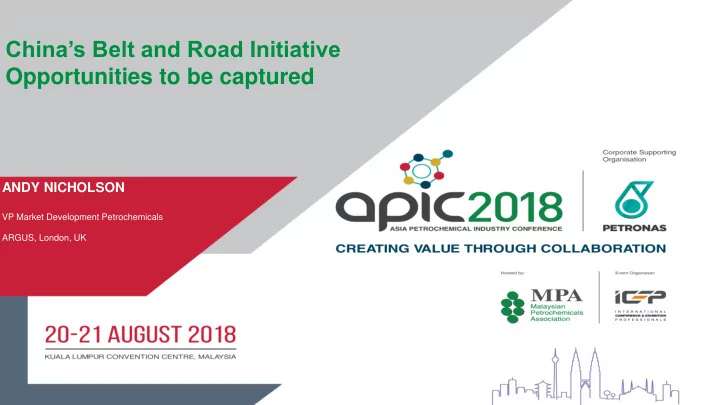

China’s Belt and Road Initiative Opportunities to be captured ANDY NICHOLSON VP Market Development Petrochemicals ARGUS, London, UK
Marco Polo The European who “discovered” the Silk Road • Born 1254, Venetian Republic. • Raised by an aunt and uncle after his mother’s death. • Sound education, dealing largely with trading matters. • Left Venice in 1269 with father and uncle to travel and trade in Asia. • Returned to Venice in 1295 with fortune in gems having journeyed some 24,000km. • Dictated “The Travels of Marco Polo” to Rusticello da Pisa in a Genoese gaol. • Married 1300 Donata Badoer; three daughters. • Died 1324, a wealthy man.
Marco Polo’s Travels 1271 -1295
Rail – Chongqing to Duisburg • 10,000km • 2,000km in China HST • 3-4 trains per week • 41 containers per train • Transit time 8 days • Countries traversed: Kazakhstan Russia Belarus or Ukraine Poland (Austria) • Train gauges change at China/Kazakhstan and Polish/German & Austrian borders. • One ship can carry as many containers as 250 trains.
Road – Kashgar to Istanbul • The original silk road – existed 2100 years ago • 4,000km • Countries traversed: Kyrgyzstan Uzbekistan (Samarkand, Bukhara) Turkmenistan Azerbaijan Georgia Turkey • RoRo ferry from Turkmenbashi to Baku (12 hours crossing time)
Sea – Quanzhou to Venice • Quanzhou was a major sea trading port in the eighth century. In the 13 th century Marco Polo travelled 2 years by sea from • Quanzhou to Hormuz, thence overland to Istanbul. • Quanzhou has today 80 shipping routes and handles freight totalling 1mn t/yr • Major stop-off points on the maritime sea road: Vietnam Indonesia Singapore & Malaysia (Samarkand, Bukhara) Myanmar India Sri Lanka Pakistan Gulf Countries Djibouti Kenya Egypt Greece
What does the Belt and Road Initiative do? For Others For China • • Expands “soft power”. Increases trading opportunities. • • Offers privileged access to Offers a source of infrastructure developing markets in Asia, investment and finance for Eurasia, the Middle East and Africa. developing countries. • • Provides secure routes of access Provides logistically efficient access for strategic raw materials (gas to the developing world’s largest from Kazakhstan). market. • • Gives opportunities to participate Gives competitive access to the developed world’s largest single in project financing and market: the European Union. construction. • • Opens up areas of inland China for Opens up areas of inland China for sale of goods and services. development.
What are the opportunities for petrochemical companies? • Sales of cost advantaged materials – example: bulk polymers. • Sales of technical products – example: engineering polymers. • Development of supply chains in cost advantaged countries such as Kazakhstan. • Development of manufacturing sites within China – example BASF. • Sales of technology.
Examples of current Chinese Imports Paraxylene Benzene 15000 '000t Others 2500 13500 India Others Iran 12000 2000 Mid-East Gulf Saudi Arabia 10500 Kuwait India 9000 Singapore 1500 Malyasia 7500 Malaysia United States Singapore 6000 1000 Oman Thailand 4500 Thailand 500 3000 Japan Taiwan Japan 1500 Korea 0 South Korea 0 2014 2015 2016 2017 2018 2014 2015 2016 2017 Q1 Q1 2018
What risks are associated with the Belt and Road Initiative? • China’s dominance of globally important structure. • Most major projects are carried out by Chinese companies. • Smaller countries become dependent on China financially – the Djibouti example. • China’s political influence is mistrusted – in Eurasia for instance. • Chinese domestic markets are managed in favor of local suppliers – ADD for styrene. • Certain regions are potentially disadvantaged by not being within the scope of the Belt and Road – South America, West Africa. • Mistrust of China accompanies a wider reaction against globalization. • China threatens the existing world order (particularly from a western perspective).
Concluding Thought Old English Proverb: The stranger, if he be not a trader, is an enemy. quoted by Bruce Chatwin in his novel “The Songlines ”. Andy Nicholson Business Development Manager Petrochemicals Argus Media Ltd Lacon House 84 Theobalds Road London WC1X 8NL Tel: +33 1 3466 5591 Mob: +33 6 89958767 andy.nicholson@argusmedia.com
Recommend
More recommend